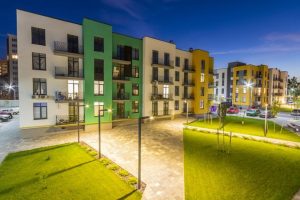Russian-speaking investors in profitable real estate abroad: an analytical study of Tranio
 In early 2018, Tranio once again investigated the behavior of Russian-speaking investors abroad. We relied on the results of an online survey, which involved 476 real estate market leaders from 33 countries.
In early 2018, Tranio once again investigated the behavior of Russian-speaking investors abroad. We relied on the results of an online survey, which involved 476 real estate market leaders from 33 countries.
The survey covered both Russian-speaking realtors working in foreign countries and Tranio partners who do not speak Russian (19% of respondents). A notable result was that the answers of many Russian and non-Russian realtors to many questions differed significantly. This may mean that those and other realtors work with different segments of Russian-speaking investors, and also that their methods of work differ.
The Tranio study showed significant differences between Russian-speaking and non-Russian-speaking realtors.
The number of investors is growing
45% of respondents believe that in recent years the number of Russian-speaking investors in real estate abroad has been growing. This is confirmed by previous Tranio studies: in 2015, 17% of respondents noted that people from Russia and other countries of the former USSR represent one of the main categories of customers, and in 2016, 27% of survey participants indicated this.
However, the statistics of the recent survey suggests that the growth of the audience of investors is accounted for mainly by non-Russian realtors, and the Russian-speaking clientele does not show a distinct dynamics.
How has the number of Russian-speaking buyers buying property for income generation changed over the last two or three years?
According to George Kachmazov, managing partner of Tranio, “among local agents there are more sophisticated specialists who can offer more interesting objects and more attractive conditions. On the other hand, Russian investors have also become more sophisticated, they often speak English, and it’s easy for them to turn to foreign-language agents. ”
The number of Russian-speaking investors in real estate abroad is growing, but this growth is mainly due to the clientele of non-Russian realtors.
A particular increase in the number of investors was noted by respondents from the Czech Republic, Cyprus, Greece and Germany. These countries are traditionally interesting for Russian-speaking buyers, moreover, now their markets are on the rise, and in many of these countries mortgage has become more profitable than a few years ago. Yulia Kozhevnikova, an expert at Tranio, adds that “interest in Greece and Cyprus is spurred by an attractive program of residence permits (in Greece) and citizenship (in Cyprus) for investments.”
Portugal, Austria, Spain and Thailand were also among the countries where there is a tendency to increase the audience of investors. However, in all these markets there is an influx of not only Russian-speaking investors, but also immigrants from other countries, in particular from China and the countries of the Middle East.
A particular increase in the number of investors is noted in the Czech Republic, Germany, Greece and Cyprus, and a decrease in Bulgaria, Hungary, Italy, Latvia and France.
On the contrary, a decrease in investment interest was noted by respondents from Bulgaria, Hungary, Italy, Latvia and France. Latvia, which in the first half of the 2010s was one of the most sought-after countries among Russian-speaking property buyers, lost its appeal after the cost of the “golden visa” in 2014 rose from 140 thousand to 250 thousand euros, and the authorities became more negative treat investors from Russia.
Investors are interested in apartment houses and mini-hotels.
Previous Tranio surveys showed that the overwhelming majority of Russian-speaking investors abroad acquire residential apartments and rental houses: 60–80% of respondents noted this option. In the 2018 survey, we focused on other types of investment property, the leaders among which were mini-hotels (up to 80 rooms) and apartment buildings, which collected 33 and 31% of the votes of the respondents, respectively.
Russian-speaking investors in profitable real estate abroad: an analytical study of Tranio (2018)
Some types of real estate demonstrate a significant difference between the responses of Russian-speaking and non-Russian realtors. In particular, among non-Russian realtors, the “Profitable houses” option scored 65% of the votes and was in the first place with a huge margin from other types (only 31% of respondents in this category indicated mini-hotels). At the same time, among Russian-speaking realtors, 33% chose mini-hotels and 27% – apartment buildings; the gap between these indicators is insignificant. The option “Cafes and Restaurants” was not mentioned by any non-Russian respondent, but every fifth Russian-speaking one chose him. Supermarkets and street stores received respectively 13 and 9% of the votes of Russian-speaking realtors and only 4% each – of non-Russian.
The most popular types of investment real estate, in addition to residential apartments and rental houses, are mini-hotels (in the first place among Russian-speaking respondents) and apartment houses (among non-Russian-speaking).


